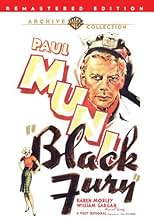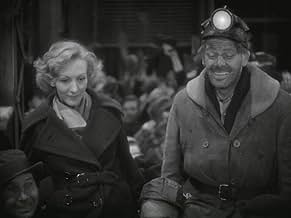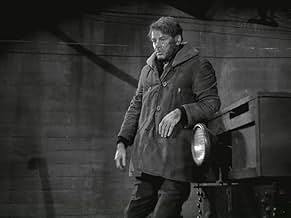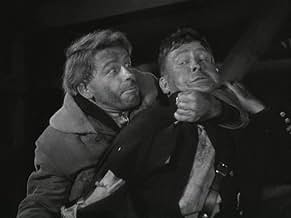IMDb RATING
6.5/10
1.1K
YOUR RATING
An immigrant coal miner finds himself in the middle of a bitter labor dispute between the workers and the mine owners.An immigrant coal miner finds himself in the middle of a bitter labor dispute between the workers and the mine owners.An immigrant coal miner finds himself in the middle of a bitter labor dispute between the workers and the mine owners.
- Nominated for 1 Oscar
- 2 wins & 2 nominations total
John Qualen
- Mike
- (as John T. Qualen)
J. Carrol Naish
- Steve
- (as J. Carroll Naish)
Joseph Crehan
- Farrell
- (as Joe Crehan)
Sara Haden
- Sophie Shemanski
- (as Sarah Haden)
G. Pat Collins
- Lefty - Company Policeman
- (as George Pat Collins)
6.51.1K
1
2
3
4
5
6
7
8
9
10
Featured reviews
A Closer Look at the Political Subtext
Dynamic social conscience movie from the 1930's studio of record, Warner Bros.-- MGM may have had the glitz, but Warners had the heart. The film is no unmixed triumph. Muni over- acts, at times outrageously, yet most importantly there's no effort at prettifying the lives of the miners. The company shacks the miners must rent are unrelievedly dingy; the streets, narrow and drab; the women, unadorned in cheap house dresses. The only polish or comfort comes from company offices, but that too is understated. The underground sets look authentic-- closed-in, dirty and dangerous. No wonder the company keeps battalions of "cops" on hand. This "company town" is more like a penal colony than a work site, and I'm reminded of the old Tennessee Ernie Ford song "Sixteen Tons". Anyone thinking these conditions exaggerate should Google "Ludlow massacre" or "United Mine Workers of America" for historical insight.
The screenplay does a good job of weaving personal stories into the larger social context. At the same time, there are several topical points to note. First, there's a union-management agreement in place at the movie's outset. Neither side is fully happy, but work is proceeding (notice miners aren't paid for work not directly that of extracting coal!). Trouble is that strike-breaking companies like the one Croner (Naish) works for aren't making money during periods of labor calm. So, through Croner, they exploit lingering grievances to break the agreement, and make money. The screenplay casts them as the real villains, and not the union nor the company. Thus, the studio plays it safe by refusing to take sides between labor and management. And if miners are still unhappy, the script suggests conditions will continue to improve with the union behind them. Then too, once the various conflicts ( miners vs. strike-breakers; Radek {Muni}vs. Mc Gee {MacLane}) culminate, a federal government, depicted as justice-seeking, steps in to punish wrong-doers and guarantee the new agreement.
Thus, the government in Washington is cast in a non-partisan and positive light. At the same time, union and management are shown as able to reconcile their differences as long as there's no outside agitation. Now, this is in practical alignment with actual New Deal policy towards emergent industrial unions and newly installed federal bargaining rules (National Labor Relations Act). On the other hand, had the script wanted, Croner could have come from the political Left (Communist or socialist) instead of the political Right (strike- breakers). In historical fact, Roosevelt had to confront militant forces from both Left and Right in forging what became a Centrist labor policy that continued for decades. At the same time, the movie reflects much of that approach. Indeed, Warner Bros. was the New Deal's best friend in Hollywood as its many topical films from that period testify.
The movie does a good job of motivating the characters. The popular Radek becomes a vulnerable fall-guy for Croner once Anna (Morley) jilts him. Revealingly, both he and Anna are motivated by desires to escape the grueling life of the mines. Farm life may, in turn, be as burdensome, but at least you're your own boss. The very real problem of alcoholism is also hinted at in several scenes, it being the one escape open to the men. Note, however, that the screenplay remains vague on the demands of the break-away union faction, perhaps to keep the audience from taking sides over the strike. Something should also be said about that fine actress Karen Morley, a real-life labor activist in the actor's union. Her angular features bordered on prettiness, but were especially effective in registering icy determination, as a number of 30's films testify (e.g. Our Daily Bread, (1934).
Despite its many dated elements, the movie should not be looked at as a dead artifact. True, many of the awful work and living conditions depicted in the movie have since been overcome, thanks to labor's right to organize and bargain. Nonetheless, in our own time, many industrial jobs have been exported to low-wage countries, while coal as an energy source has been de-emphasized. Nonetheless, the basic conflicts between labor and management remain, whether blue-collar or white-collar, while government's role remains key. And in a sagging economy rife with unemployment and stagnant wages, old movies like Black Fury continue to resonate.
The screenplay does a good job of weaving personal stories into the larger social context. At the same time, there are several topical points to note. First, there's a union-management agreement in place at the movie's outset. Neither side is fully happy, but work is proceeding (notice miners aren't paid for work not directly that of extracting coal!). Trouble is that strike-breaking companies like the one Croner (Naish) works for aren't making money during periods of labor calm. So, through Croner, they exploit lingering grievances to break the agreement, and make money. The screenplay casts them as the real villains, and not the union nor the company. Thus, the studio plays it safe by refusing to take sides between labor and management. And if miners are still unhappy, the script suggests conditions will continue to improve with the union behind them. Then too, once the various conflicts ( miners vs. strike-breakers; Radek {Muni}vs. Mc Gee {MacLane}) culminate, a federal government, depicted as justice-seeking, steps in to punish wrong-doers and guarantee the new agreement.
Thus, the government in Washington is cast in a non-partisan and positive light. At the same time, union and management are shown as able to reconcile their differences as long as there's no outside agitation. Now, this is in practical alignment with actual New Deal policy towards emergent industrial unions and newly installed federal bargaining rules (National Labor Relations Act). On the other hand, had the script wanted, Croner could have come from the political Left (Communist or socialist) instead of the political Right (strike- breakers). In historical fact, Roosevelt had to confront militant forces from both Left and Right in forging what became a Centrist labor policy that continued for decades. At the same time, the movie reflects much of that approach. Indeed, Warner Bros. was the New Deal's best friend in Hollywood as its many topical films from that period testify.
The movie does a good job of motivating the characters. The popular Radek becomes a vulnerable fall-guy for Croner once Anna (Morley) jilts him. Revealingly, both he and Anna are motivated by desires to escape the grueling life of the mines. Farm life may, in turn, be as burdensome, but at least you're your own boss. The very real problem of alcoholism is also hinted at in several scenes, it being the one escape open to the men. Note, however, that the screenplay remains vague on the demands of the break-away union faction, perhaps to keep the audience from taking sides over the strike. Something should also be said about that fine actress Karen Morley, a real-life labor activist in the actor's union. Her angular features bordered on prettiness, but were especially effective in registering icy determination, as a number of 30's films testify (e.g. Our Daily Bread, (1934).
Despite its many dated elements, the movie should not be looked at as a dead artifact. True, many of the awful work and living conditions depicted in the movie have since been overcome, thanks to labor's right to organize and bargain. Nonetheless, in our own time, many industrial jobs have been exported to low-wage countries, while coal as an energy source has been de-emphasized. Nonetheless, the basic conflicts between labor and management remain, whether blue-collar or white-collar, while government's role remains key. And in a sagging economy rife with unemployment and stagnant wages, old movies like Black Fury continue to resonate.
10kcfl-1
Best film of year
Let's look at 1935: I don't think there's anyone reviewing now who went to the movies that year, so we have to rely on video. I've seen about 100 films from that year; many have not been preserved. "The Informer"won the Oscar, and a worthy film it was. "A Night at the Opera," "ChinaSeas," "The Good Fairy" "Lives of a Bengal lancer," "Naughty Marietta,"and "The Devil Is a Woman" also came out that year, all great films. "Black Fury" was better than any of them. It's gripping from the first frame to the last. It's as realistically set, and politically sensitive, as any Hollywood film. The closest political thriller I've seen to it is "Massacre" (1934). I loved it for the big factors, like digging itself into an impossible hole, then managing to escape, and Muni's performance. Also for the small ones, like all the supporting performances and the fact that the union happens to be integrated.
Woman is for man like rain is for the dirty ground
Joe Radek (Paul Muni) is a simple-minded, hardworking immigrant coal miner who dreams of buying a farm and settling down with his girl, Anna (Karen Morley). But when Anna leaves him for another man, Joe falls apart and takes to drinking. In Joe's current state of mind, he's manipulated by a union buster (J. Carrol Naish) into revolting against the mining company. This has disastrous results for the laborers but Joe determines to set things right by any means necessary.
Paul Muni's only film with director Michael Curtiz. As was often the case with Muni, his performance can be seen either as brilliant or 100% ham. Whichever it is, I enjoyed it a lot. The cast is full of reliable Warner Bros contract players that are always fun to watch, especially great character actor J. Carrol Naish. It's not surprising this is from WB, the 1930s home of movies about the working class. Certainly interesting from a historical and sociological perspective as a view of labor issues in Depression-era America. It's also fine dramatic entertainment. Based in part on a true story of a 1929 incident at a mine in Imperial Pennsylvania.
Paul Muni's only film with director Michael Curtiz. As was often the case with Muni, his performance can be seen either as brilliant or 100% ham. Whichever it is, I enjoyed it a lot. The cast is full of reliable Warner Bros contract players that are always fun to watch, especially great character actor J. Carrol Naish. It's not surprising this is from WB, the 1930s home of movies about the working class. Certainly interesting from a historical and sociological perspective as a view of labor issues in Depression-era America. It's also fine dramatic entertainment. Based in part on a true story of a 1929 incident at a mine in Imperial Pennsylvania.
Classic Paul Muni FILM
Never realized that Paul Muni, (Joe Radek) played in a film concerning miners in Pennsylvania and gave such an outstanding performance beyond anything I realized he had accomplished in his long career on the silver screen. In this film Joe Radek is an immigrant to this country, however, he is very clever in many ways and seeks justice for his fellow workers in the coal mine in which the town people work. Karen Morley,(Anna Novak) gives a great supporting role to this film and really loves Joe Radek and what he is trying to accomplish. The town is controlled by the coal mine owners and Barton MacLane,( McGree )along with William Gargan,(Slim Johnson/Company Police bully the people in the town along with J Carrol Nash,(Steve Croner) who all work against the miners and control their living conditions. There is a big problem trying to establish a Labor Union and there is a constant battle between the very poor and rich people of the community. Paul Muni gave the best performance I have ever seen in this Classic 1935 film, don't miss this picture.
Black Fury- Incisive Labor Film ***
The fabulous Paul Muni gives another wonderful performance in this 1935 film.
With a genuine Slavic accent, Muni is superb as a coal miner who loses his girl (Karen Morley) to a company Policeman and goes on a drinking binge as a result. It is at this point that a gangster organization tries to create chaos within the union and Muni becomes their perfect foil.
J. Carrol Naish is excellent as the worker who works for this unholy organization.
Naturally, Muni's best friend is killed in a clash with company police and Muni, now sober, vows revenge.
Morley returns to Muni just in time as he goes down into the mine and starts blowing the place up. It's at this point that the film starts to go down, but with Muni's performance and the problems shown of what the coal miners had to endure plus the dishonesty in trying to break the union, all make for a very good film.
With a genuine Slavic accent, Muni is superb as a coal miner who loses his girl (Karen Morley) to a company Policeman and goes on a drinking binge as a result. It is at this point that a gangster organization tries to create chaos within the union and Muni becomes their perfect foil.
J. Carrol Naish is excellent as the worker who works for this unholy organization.
Naturally, Muni's best friend is killed in a clash with company police and Muni, now sober, vows revenge.
Morley returns to Muni just in time as he goes down into the mine and starts blowing the place up. It's at this point that the film starts to go down, but with Muni's performance and the problems shown of what the coal miners had to endure plus the dishonesty in trying to break the union, all make for a very good film.
Did you know
- TriviaThough it received no official Oscar nominations, the Academy permitted write-in candidates this year and when the voting order was announced it turned out that Paul Muni had come in second in the balloting, narrowly behind winner Victor McLaglen but ahead of any of the other nominated actors.
- GoofsAt c. 24 minutes Joe is counting out his money, but he is inconceivably inaccurate. After counting to 68 dollars he places two further bills on the table and counts "73" out loud. A few moments later he counts up to 75 dollars, but, after four more bills have been placed in front of him he announces "76" dollars as his total.
- ConnectionsFeatured in Hollywood and the Stars: The Angry Screen (1964)
- SoundtracksWhy Do I Dream Those Dreams?
(1934) (uncredited)
Music by Harry Warren
Played on piano in bar during scene where men challenge Radek
Details
- Release date
- Country of origin
- Language
- Also known as
- Black Hell
- Filming locations
- Warner Ranch, Calabasas, California, USA(mine shaft scenes)
- Production company
- See more company credits at IMDbPro
- Runtime
- 1h 34m(94 min)
- Color
- Sound mix
- Aspect ratio
- 1.37 : 1
Contribute to this page
Suggest an edit or add missing content








































